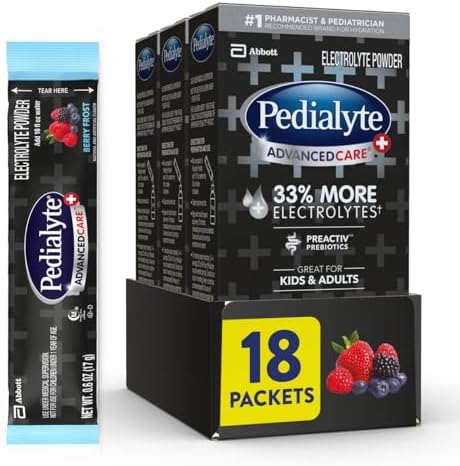After Workout Meal: Top 9 Recovery Meals with Keto Options
This post may contain affiliate links. If you purchase through these links, I may earn a small commission at no extra cost to you. LEARN MORE.
Exercise is a vital part of a healthy lifestyle. Eating the right foods after working out is equally important.
If you want to get the most out of your training, it’s key to focus on meals that replenish energy and support muscle recovery. Eating a balanced combination of proteins, carbohydrates, and fats can aid in faster recovery and muscle growth.
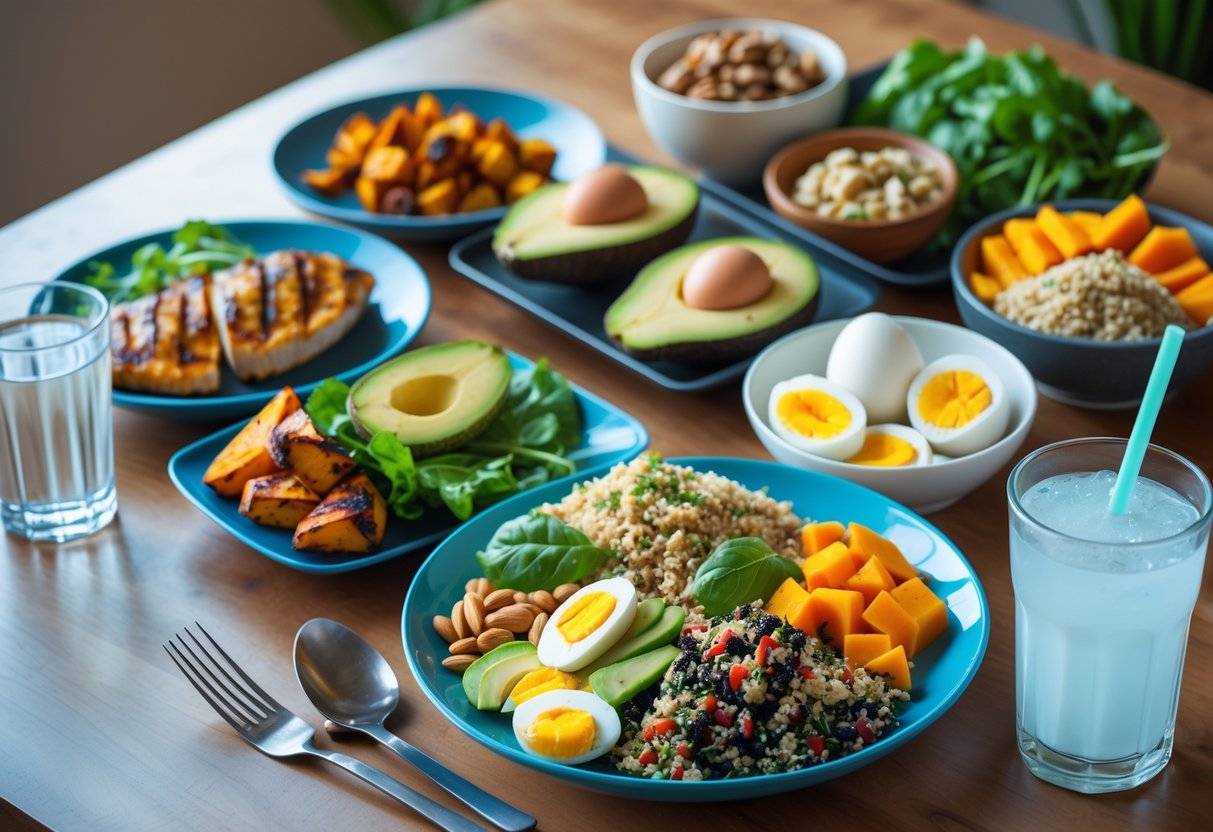
For those following a keto diet, finding the right meal might seem challenging. There are plenty of tasty and effective options out there.
Eggs, chicken, and MCT oil provide essential nutrients for recovery without disrupting ketosis. Combining these with nutrient-packed veggies or seeds can help maintain optimal post-workout nutrition.
Want a recovery meal plan customized to your body and fitness goals? Start with this Custom Keto Diet Plan — perfect for keto beginners or active individuals.
Key Takeaways
- Balanced meals with proteins, carbs, and fats boost recovery.
- Keto options like eggs and MCT oil support muscle repair.
- Consistent nutrition aids long-term fitness progress.
The Importance of Post-Workout Nutrition
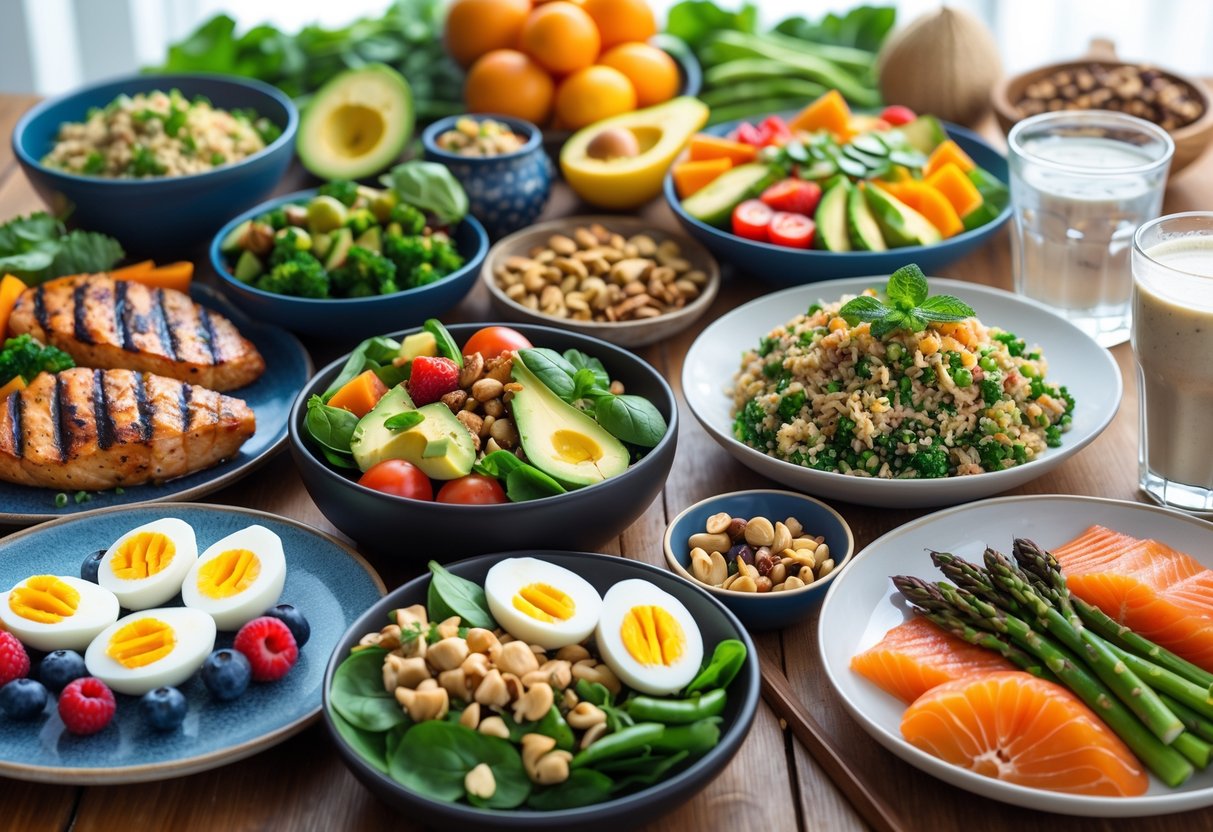
Eating the right foods after exercising can greatly enhance muscle recovery and energy maintenance. Key factors like macronutrients and nutrient timing play critical roles in maximizing workout recovery.
Why Nutrition Matters for Recovery
After a workout, the body undergoes a recovery phase. Muscles are in need of repair, and energy stores must be replenished.
Protein is essential as it helps rebuild muscle fibers. Carbohydrates are important too.
They restore glycogen, the energy source in muscles. Without proper nutrients, recovery can be slow.
Fats, though not as discussed, support hormone function, which aids recovery. The right balance of these macronutrients ensures effective muscle recovery and energy replenishment.
Understanding Macronutrients After Exercise
Macronutrients are crucial after a workout. Proteins, carbohydrates, and fats each have specific roles.
Protein sources like chicken, fish, or eggs aid in muscle repair. Carbs, found in foods such as rice or sweet potatoes, restore lost glycogen.
Healthy fats, like those in avocados and nuts, help with energy and hormone levels. Balance is vital.
An ideal post-workout meal combines all three macronutrients, promoting muscle recovery and sustained energy.
How Nutrient Timing Impacts Results
Timing of nutrient intake after a workout is important. Consuming food shortly after exercising can lead to better results.
Studies suggest eating protein and carbs within two hours post-exercise maximizes muscle repair. Immediate intake helps replenish glycogen faster.
This supports continued energy and readiness for the next workout. In keto diets, low-carb meal timing is key too.
Protein remains essential, consumed alongside fats for effective recovery. So, paying attention to when and what you eat truly matters for your fitness journey.
In our post on What to Eat Before a Workout, we covered how pre-workout meals fuel performance. Now, let’s focus on recovery.
Essential Nutrients for Optimal Recovery
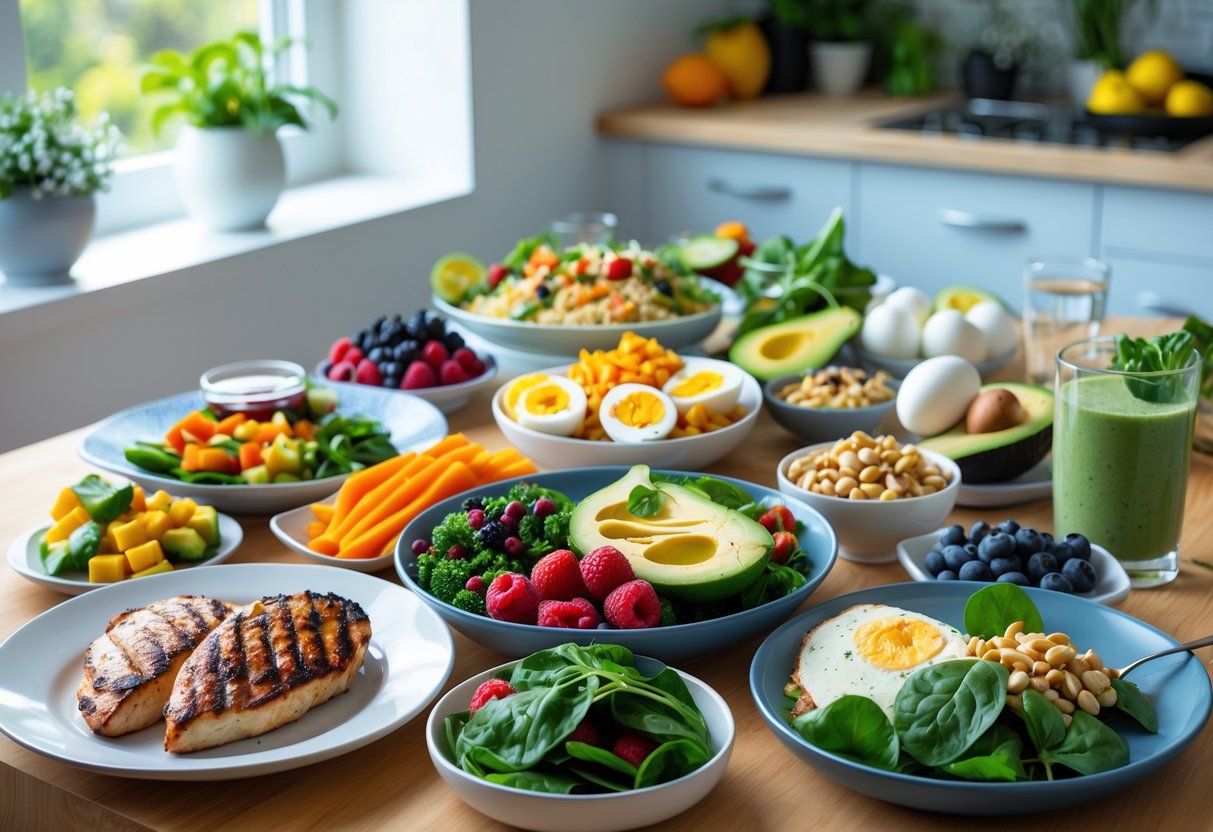
After a workout, the body needs specific nutrients to repair muscles, replenish energy, and maintain hydration. This includes proteins, carbohydrates, healthy fats, and electrolytes.
Protein and Amino Acids for Muscle Repair
Protein is essential for repairing and building muscles after exercise. Consuming protein after a workout helps the body recover and grow stronger.
Amino acids, the building blocks of protein, play a critical role in this process. Essential amino acids like leucine, isoleucine, and valine support muscle repair and promote muscle synthesis.
Foods rich in protein and amino acids include chicken, fish, eggs, and plant-based options like beans and lentils. Including these in post-workout meals aids recovery and enhances muscle growth.
Looking for source of protein? Check out these best selling protein powder from Amazon below.
Carbohydrates for Glycogen Replenishment
Carbohydrates are vital for replenishing glycogen stores that become depleted during exercise. Glycogen, stored in the muscles and liver, is a crucial energy source during workouts.
Consuming carbs after exercise restores these levels, helping to maintain energy for future workouts. Foods like rice, potatoes, and fruits provide the necessary carbohydrates.
For those on a keto diet, low-carb options still offer some glycogen replenishment without kicking the body out of ketosis.
Fats and Their Role in Recovery
Healthy fats, such as those found in avocados, nuts, and olive oil, contribute to recovery by providing sustained energy and supporting hormone balance. While carbohydrates and protein take the spotlight, fats are also important.
They help with the absorption of fat-soluble vitamins that aid muscle repair and can reduce inflammation. Including moderate amounts of healthy fats in post-workout meals ensures a balanced nutrient intake that complements repair and recovery processes.
Hydration and Electrolyte Balance
Staying hydrated is crucial after exercise. Water helps regulate body temperature and transport nutrients to cells.
Electrolytes, like sodium, potassium, and magnesium, help maintain fluid balance and prevent dehydration. Post-workout, replenishing electrolytes lost through sweat is important.
Consuming drinks like coconut water or sports drinks, or foods high in electrolytes, supports the body’s recovery and prevents muscle cramps and fatigue. This ensures that the body is ready for the next exercise session.
Dehydration is one of the Common Keto Mistakes — especially post-exercise. Replenishing electrolytes is critical. Try these top rated electrolytes powder from Amazon below.
9 Effective Recovery After Workout Meals
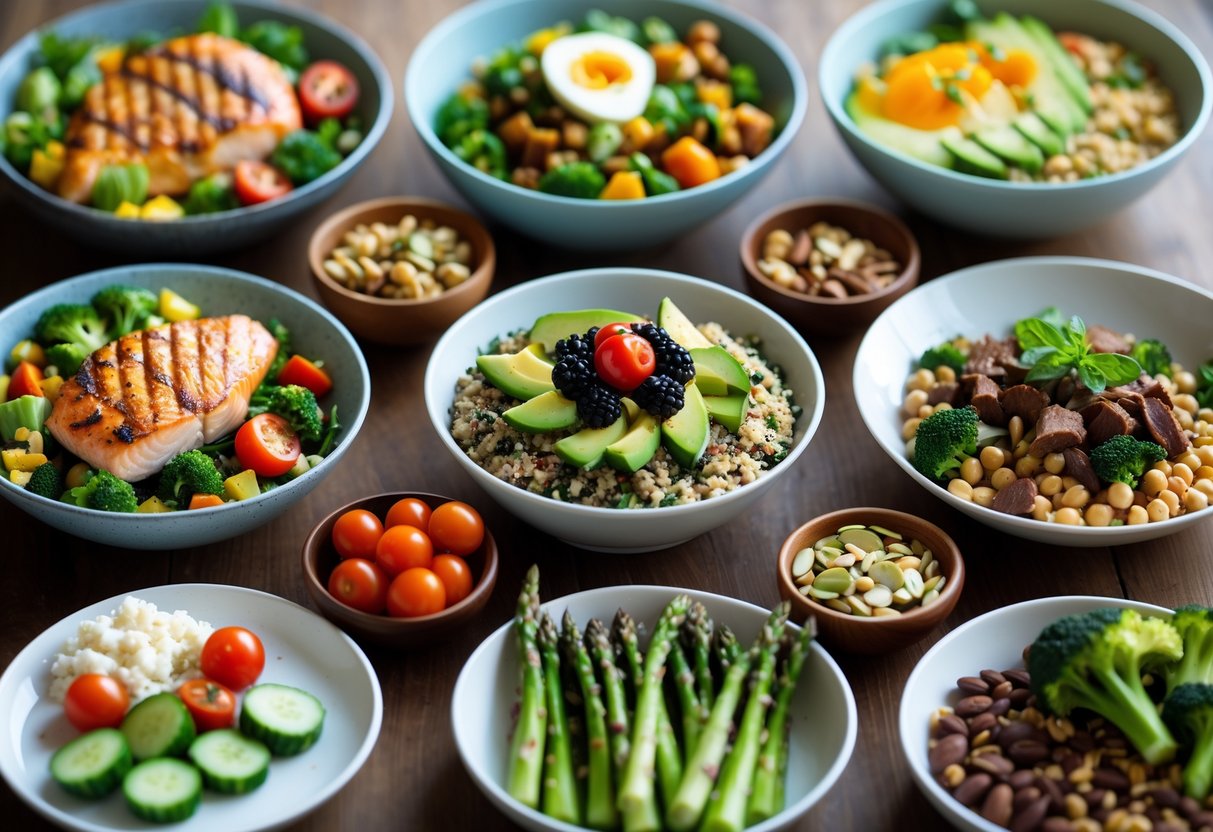
After a workout, it’s crucial to replenish nutrients and support muscle recovery. The following meals combine proteins, healthy carbohydrates, and essential vitamins to aid recovery and energy levels.
Grilled Chicken with Brown Rice and Vegetables
Grilled chicken is a lean protein source that helps repair muscle tissue. It’s packed with essential amino acids crucial for muscle recovery.
Pair it with brown rice and vegetables for a balanced meal. Brown rice is rich in complex carbohydrates, providing a slow-release of energy that keeps glycogen levels steady.
Vegetables add vitamins and antioxidants, which combat inflammation and support immune health. This meal is nutritious and offers a great balance for post-exercise recovery.
Greek Yogurt Parfait with Bananas and Quinoa
Greek yogurt is a high-protein option that contains probiotics for gut health. Mixing it with bananas adds natural sugars and potassium, an electrolyte that helps prevent muscle cramps after workouts.
Quinoa, a complete protein, contains all nine essential amino acids. It’s also a good source of complex carbohydrates, providing sustained energy.
This parfait is easy to prepare and combines flavors and textures that make it a delicious recovery option.
Eggs on Whole Grain Bread
Eggs are a powerhouse of protein and contain important nutrients like vitamin D and choline. They are versatile, easy to cook, and help with muscle synthesis.
Placing eggs on whole grain bread ensures you’re getting a serving of complex carbohydrates. Whole grains are rich in fiber and help maintain blood sugar levels, preventing the energy crash that can occur after exercise.
This simple meal is perfect for recovery and keeping energy levels stable.
Tofu Stir-Fry with Complex Carbohydrates
For a plant-based recovery meal, tofu offers substantial protein and iron. It supports muscle repair and is a great option for those avoiding animal products.
Stir-frying tofu with a mix of colorful vegetables boosts the meal’s nutritional profile. Including complex carbohydrates such as brown rice or quinoa provides long-lasting energy and replenishes glycogen stores.
This meal is both nutritious and satisfying, promoting optimal recovery post-workout.
Prefer low-carb alternatives? Explore 10 Lazy Keto Meal Ideas that support recovery and save time.
Keto-Friendly Post-Workout Meals
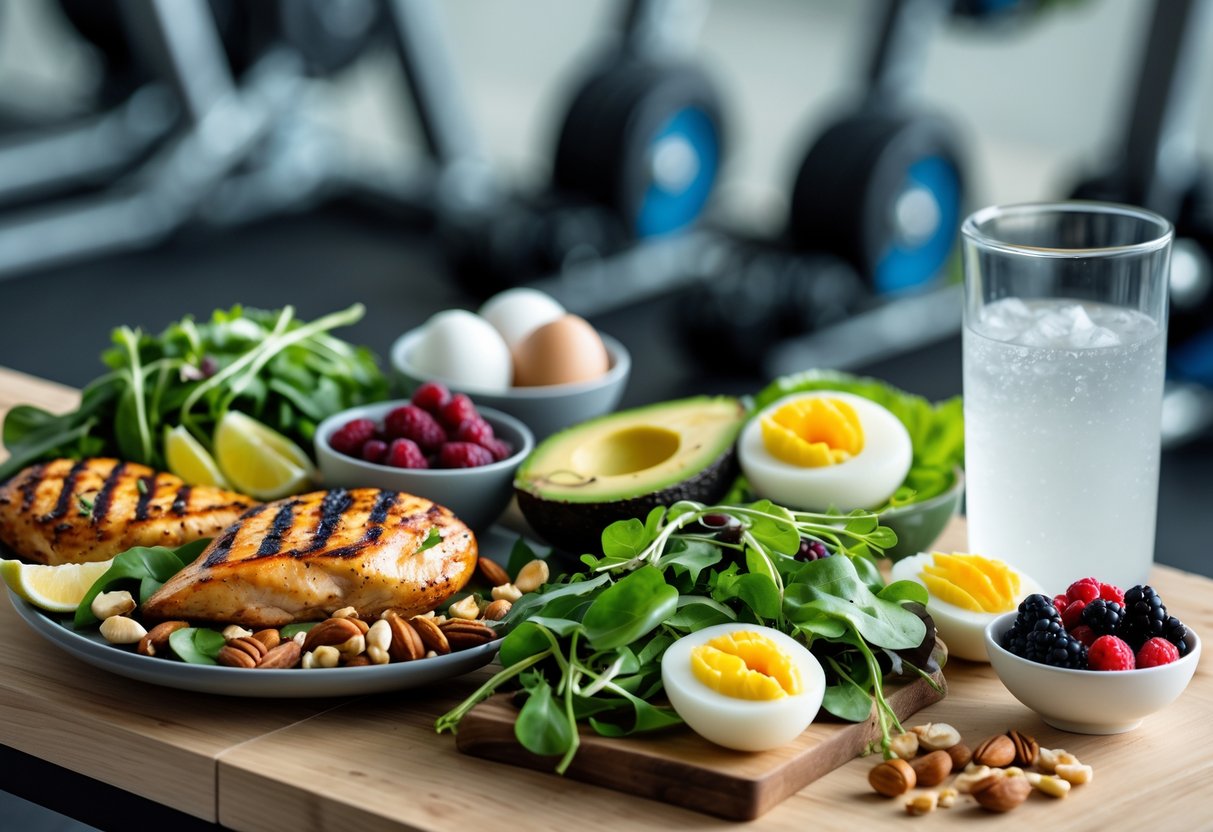
After a workout, it’s important to refuel with meals that support muscle recovery while keeping ketosis in mind. High-protein, healthy fats, and low carbs are the focus here.
These meals combine ingredients like whey protein, avocados, and tofu to help with recovery and nutrition.
High-Protein Keto Smoothie with Whey Protein Powder
A high-protein keto smoothie is an easy and quick option for post-workout recovery. Whey protein powder is the star ingredient as it offers essential amino acids that help repair muscle tissues.
It’s rich in protein and blends well with other low-carb additions. MCT oil or a spoon of peanut butter can boost healthy fats, making it perfect for energy.
For extra nutrients, adding spinach can increase vitamins without adding many carbs. To keep it sweet yet keto-friendly, berries such as strawberries or blueberries are great choices.
They add flavor without spiking blood sugar levels. Blend everything until smooth, and it’s ready to drink!
Eggs and Avocado with Leafy Greens
Eggs are excellent protein sources and combined with avocado, they create a meal rich in healthy fats. This provides sustained energy and feeling of fullness after intense exercise.
Cooking eggs in butter or olive oil further boosts fat intake, essential for anyone on a ketogenic diet.
Serve this with leafy greens like spinach or kale. They add fiber, vitamins, and minerals, supporting overall health.
A sprinkle of seeds or nuts such as flaxseeds or walnuts can enhance the nutritional value, adding texture and crunch without
Want to stay in ketosis while getting your nutrients? Learn about Clean Keto vs Dirty Keto to make the right ingredient choices.compromising the keto approach.
Tofu Salad with Healthy Fats
Tofu is versatile and a great plant-based option for protein. When used in a salad, it can absorb flavors and offer a satisfying texture.
This makes it a suitable choice for keto enthusiasts who prefer alternatives to animal-based proteins. Adding nuts like almonds or pecans introduces healthy fats, which are vital for energy and keeping you in ketosis.
Avocado oil or olive oil is recommended for dressing, providing additional monounsaturated fats. To keep it varied and interesting, throw in some low-carb vegetables such as bell peppers and cucumbers.
This not only adds flavor but also essential nutrients.
Try this Custom Keto Diet Plan that includes variety dishes built for your fitness needs.
Maximizing Muscle Recovery and Growth
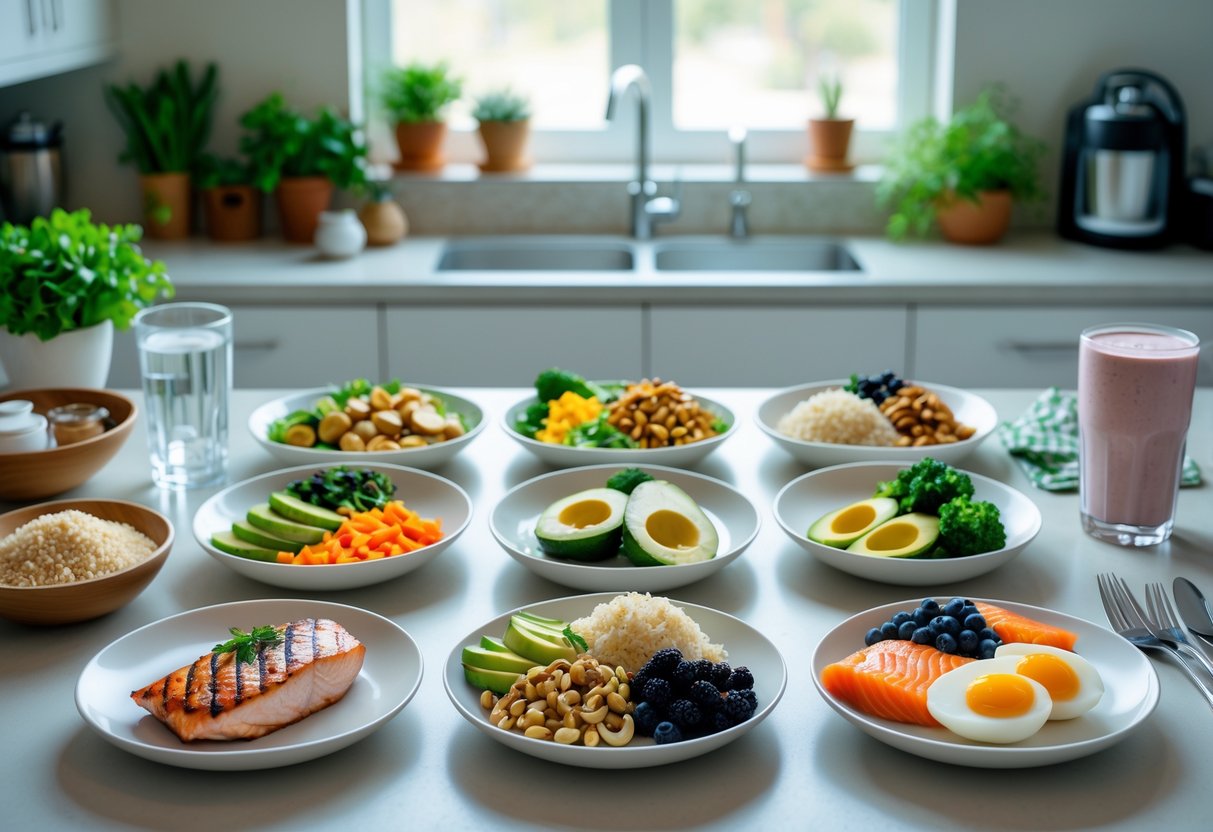
After a workout, the right nutrients are vital for muscle recovery and growth. Protein supplements like whey or plant-based options, along with Branched-Chain Amino Acids (BCAAs), play a big role.
Additionally, creatine helps improve recovery and muscle growth. Managing inflammation with the right strategies can also reduce muscle soreness.
Using Protein Supplements and BCAAs
Protein is crucial for muscle growth and recovery. Whey protein is a popular choice among athletes and bodybuilders because it’s easily absorbed and rich in essential amino acids.
Plant-based proteins like pea or soy are great alternatives for those avoiding dairy.
Branched-Chain Amino Acids (BCAAs), found in protein supplements, further support recovery. They include leucine, isoleucine, and valine, which are known to aid in muscle repair and reduce exercise-related fatigue.
Combining protein with carbohydrates after a workout ensures increased muscle glycogen, essential for energy during your next session.
A post-workout shake, including protein and carbs, can be convenient and effective.
Creatine and Its Recovery Benefits
Creatine is a well-researched supplement known for boosting muscle strength and recovery. By increasing phosphocreatine stores in the muscles, it enhances energy production, helping with more intense and longer workouts.
It also plays a role in reducing muscle damage and inflammation post-exercise.
Taking about 3-5 grams of creatine per day can be beneficial, with most people noticing positive effects within a few weeks.
Try these top creatine supplement from Amazon below.
Managing Inflammation and Muscle Soreness
Proper management of inflammation is key to avoiding lingering muscle soreness. Foods rich in omega-3 fatty acids, like salmon and flaxseeds, have anti-inflammatory properties, helping minimize soreness and promoting faster recovery.
Incorporating antioxidant-rich foods such as berries and green leafy vegetables can also reduce inflammation-related muscle damage.
Stretching and foam rolling after workouts are great physical methods to alleviate muscle tension and soreness.
Staying hydrated and getting adequate rest are simple yet effective ways to support the body’s natural recovery processes and keep inflammation in check.
For more metabolism-boosting options, check out our review on Java Burn for Keto and Weight Loss.
Tips for Consistency and Long-Term Success
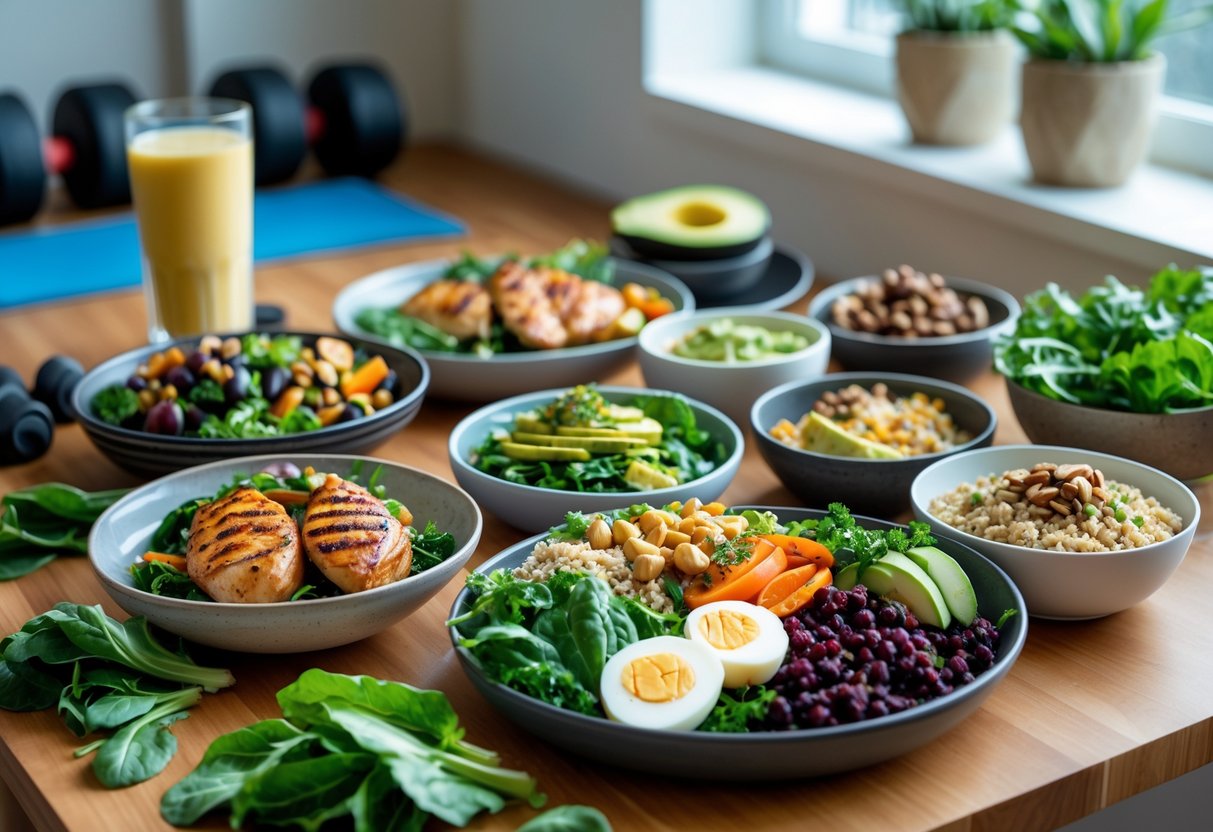
Staying consistent with meals and maintaining a supportive diet are key to achieving long-term success in fitness and health.
This involves tracking nutrients, adjusting meals based on personal goals, and ensuring the body’s immune system is supported.
Tracking Nutrient Intake for Better Results
To make the most out of workout recovery, tracking nutrient intake is vital. A balanced diet should include the right mix of proteins, fats, and carbohydrates.
By using food journals or apps, individuals can track their daily intake. This helps in identifying nutrient deficiencies or excesses, ensuring that the diet supports both muscle recovery and overall health.
Each meal should include lean proteins like chicken or fish, alongside healthy fats from avocados or nuts.
Staying consistent with meal tracking helps maintain focus on dietary goals and adjust as needed.
Adjusting Meals for Weight Loss or Body Composition
Achieving desired weight or body composition requires tailoring meals to meet specific goals. When aiming for weight loss, reducing calorie intake and focusing on nutrient-dense foods is crucial.
This can mean swapping out high-calorie snacks for fruits or vegetables.
For those focusing on building muscle, increasing protein intake while maintaining balance with carbohydrates and fats can be beneficial.
Adjusting portion sizes and meal frequency also plays a significant role in reshaping the body. Being attentive to the body’s response to these changes helps fine-tune dietary habits for lasting results.
Supporting the Immune System Through Diet
Supporting the immune system is essential, especially for those who exercise regularly. Nutrients like vitamin C from citrus fruits and zinc found in nuts and seeds enhance immune function.
Including antioxidants-rich foods like berries can also protect the body from stress induced by intense workouts.
Staying hydrated is equally important; water not only aids recovery but also supports immune health.
By incorporating a variety of colorful fruits and vegetables in meals, individuals can ensure they receive a wide range of micronutrients, keeping the immune system strong and more resilient.
For busy days, use Keto-Friendly Snacks that support recovery without compromising your macros.
Frequently Asked Questions
After working out, it’s important to focus on meals and snacks that support recovery and muscle building.
Below are specific recommendations for high-protein and low-carb options, especially suitable for those following keto.
What are optimal high-protein, low-carb meals for post-workout recovery?
Meals like grilled chicken with roasted vegetables and baked salmon with asparagus are excellent choices.
These dishes provide protein and healthy fats while keeping carbs low, which is great for muscle recovery.
Which shake recipes are recommended for keto dieters after exercising?
Keto-friendly shakes might include ingredients like MCT oil and collagen.
A simple mix could be unsweetened almond milk blended with a scoop of protein powder, a tablespoon of MCT oil, and a handful of ice for a refreshing post-workout drink.
What snacks are suitable for low-carb diets to consume after a workout?
Nuts, seeds, and berries are good snacks for low-carb diets post-exercise.
Avocados and cheese pairings also offer a nice balance of fats and protein, perfect for recovery.
How does following a ketogenic diet affect muscle recovery post-exercise?
A ketogenic diet can help in preserving muscle by using fats as an energy source.
It may support muscle recovery, but attention should be paid to adequate protein intake to complement the high-fat focus of the diet.
Can you suggest no-bake protein ball recipes that are keto-friendly?
Keto-friendly protein balls can be made with almond flour, unsweetened coconut flakes, protein powder, and nut butter.
Mix in some cacao nibs or nuts for added texture and flavor.
What are some keto-friendly pre-workout meal suggestions?
For pre-workout meals, consider an egg omelet with avocado or Greek yogurt with seeds.
These options provide energy and nutrients to sustain a workout while aligning with keto dietary guidelines.
Conclusion
Post-workout meals are important for everyone, whether they follow a keto diet or not.
They help with muscle recovery and give needed nutrients.
Some great choices include chicken and fish like baked salmon.
Plant-based proteins are also good options.
These foods are packed with protein, which is essential after exercising.
Including carbs can also aid in restoration.
Options like potatoes, rice, and fruits provide the necessary energy.
For those in keto, high-fat and low-carb options like eggs or avocado are useful.
They give energy without kicking them out of ketosis.
Staying mindful of portions and timing also makes a difference.
Eating within an hour of finishing a workout can maximize benefits.
Whether your goal is fat loss or lean muscle, fueling your body the right way post-workout is key. Get your Custom Keto Diet Plan designed for fast recovery and real results.




